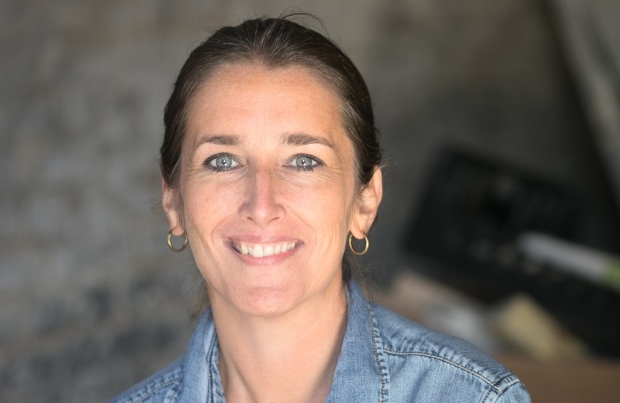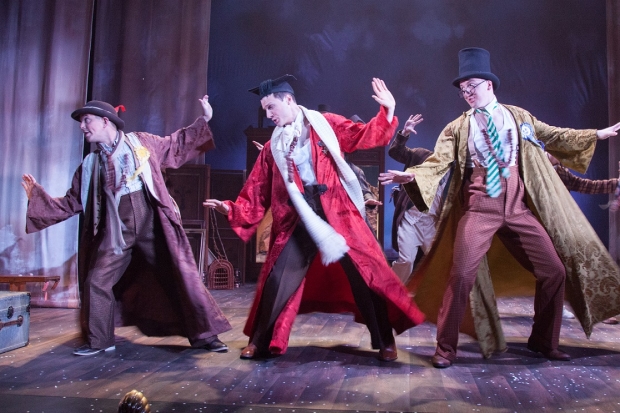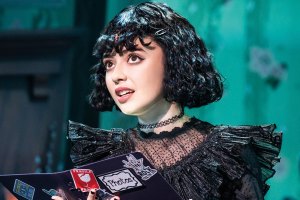Sasha Regan and her merry men: back on the Gilbert and Sullivan trail
The director takes another all-male Gilbert and Sullivan show on the road. This time it’s Iolanthe

© Kay Young
Sasha Regan's men-only Gilbert and Sullivan productions may be small affairs, conceived on a shoestring and performed with piano accompaniment, yet they've done more in the past decade to keep the Savoyard flame alive than almost anyone else. Whether the absence of women is a creative inspiration or catchpenny selling point, audiences have taken them to their heart and HMS Pinafore, The Pirates of Penzance and The Mikado have conquered audiences at home and abroad.
Where they go the director's name goes with them; hence the current tour, a revival of her Iolanthe (which reaches the Richmond Theatre next week), is billed as Sasha Regan's All-Male Iolanthe. Yet there is nothing megalomaniacal about the practical and genial director who spoke to WhatsOnStage during rehearsals in her happily chaotic office in Southwark's Union Theatre. Was she looking for a gimmick when the series started?
It's not about coming into the rehearsal room and trying to play a girl
"No, it was a way of bring a sense of youth to the operas, and I wanted to avoid doing the operas the way they've been done for so long. When you have these young actors who probably don't know much about Gilbert and Sullivan, I think it helps bring an innocence so that the heart is very much still in the piece. Maybe we could do it with a young mixed cast now but people enjoy us doing it with just boys. We can have them giggling, but then when we need the audience to feel the sorrow of Iolanthe, the trick is to find the sadness."
Does Sasha Regan have to fine-tune the camp? "Definitely. I have to shout 'it's not Showgirls'! We have them walking round with books on their heads to try and give them an old-fashioned femininity. It's not about coming into the rehearsal room and trying to play a girl, it's about playing your character, and a character of that time. A lot of the boys have never done anything like it at all."
A cynic would say that she's reviving Iolanthe to capitalise on ENO having just done their own version, but no. "It's pure coincidence. We found out they were doing it after we'd started programming the tour, and it was the same with The Pirates of Penzance, which we also did the year ENO did theirs. Lizzie Gee was our choreographer on Pirates and on HMS Pinafore, and Daniel Kramer gave her the Iolanthe gig on the strength of her work for us."
Mike Leigh's leaden ENO Pirates was crying out for a Lizzie Gee. "I didn't see it. And I was invited to the press night of Iolanthe but we were just in the middle of our own audition process, about to go into rehearsals, and I just think it's better not to see someone else's version and get that into your head when you're doing your own work.
"We're hoping we can do Pirates again next year, because over the last five years we've built up new audiences so they won't have seen it first time round. And I've still got the costumes under my bed!"

© Harriet Buckingham
Regan's productions are always original and hilarious, yet they stay faithful to the Gilbert and Sullivan spirit. Is that down to forward planning or creativity the rehearsal room? "With Iolanthe we have a deaf choreographer, Mark Smith, so when we met up in the pre-rehearsal stage we looked at the score to find ways of doing it,and before we knew it the choreography for the fairies was built using actual sign language. So yes, snippets come into our heads before we start, but then ideas occur all the way through rehearsals. For example, in HMS Pinafore with "For he is an Englishman" we got all the actors to create different images of what came into their heads for being British, and I created the stage pictures from there. It starts as an acting exercise and then the choreographer takes over and makes it good, making it fit the music."
There seems to be a core group of regulars who stay on from show to show. "Yes, but they all keep getting nice jobs! Alan Richardson, who has been our 'leading lady' for a long time, is in the West End playing Mary Sunshine in Chicago so we've lost him this year. But he's been doing vocal coaching for us throughout the rehearsal process. He's very much part of our family, and his knowledge of the voice means that even in the auditions he gets the lads to relax vocally, know when to tilt their voice, where to place it and not being scared of it. Alan can explain to a novice how to place certain lines in a song, and all of a sudden it comes soaring out. He's very clever.
In this year's auditions we've noticed that new graduates have been taught to use their falsetto properly
"In this year's auditions we've noticed that new graduates have been taught to use their falsetto properly, whereas ten years ago we couldn't get anyone. We're getting ensemble singers now who are as good as our leads were ten years ago. Maybe they're aware that falsetto is a tool they may have to use more now after their training. I used to have sleepless night wondering when we would cast it but now it's a lot easier."
Where do Regan's concepts fit in? The Mikado, for example, was set in a 1950s campsite. "That was a tricky one for us because nowadays you can't put The Mikado on with Japanese make-up, and at the same time you're trying to find a place where a group of boys might congregate. We went round in circles and it was a real challenge. But then Ryan Dawson Laight the designer brought in some beautiful imagery that worked. I do like a simple design that allows us to concentrate on the actors: that one was really just three tents, and we had them all through rehearsals. It forces you to be creative in the rehearsal space.
"When we took Pirates to the Sydney Theatre in Australia, quite a wealthy venue, their artistic director asked where I got the inspiration for a blackout in "With Cat-Like Tread". I told him it's because at the Union Theatre where we first did it we'd run out of lighting channels by that point so we ended up doing it with hand-held torches. Lack of resources forces you to be inventive!"



















